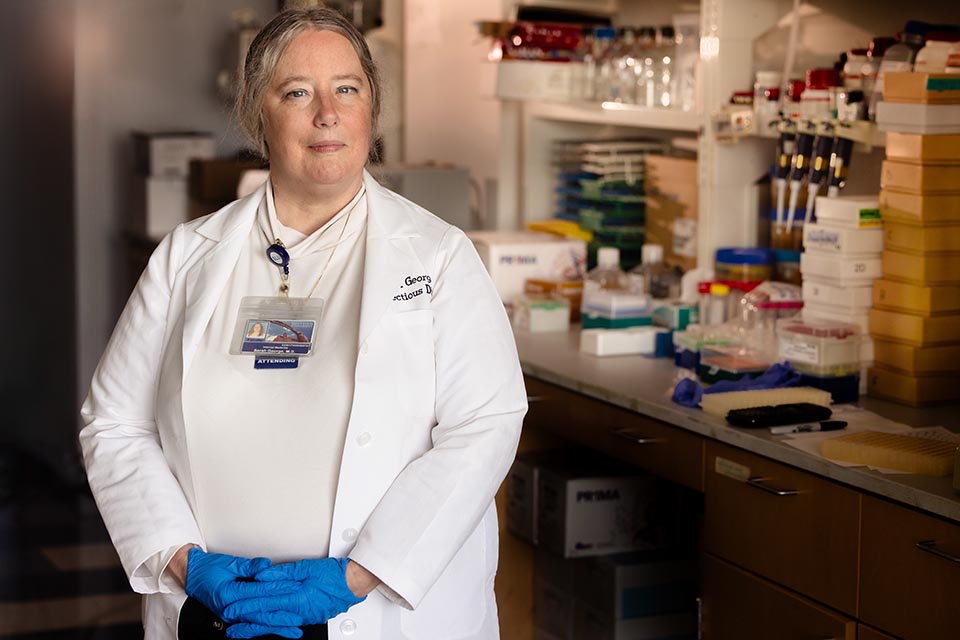SLU Becomes First U.S. Institution to Offer Geospatial Workforce Training to DoD’s Australian Government Partner
The course is part of a $5 million, five-year GEOINT Learning through Academic Program
ST. LOUIS – As part of an agreement between Saint Louis University and the Department of Defense (DoD) and National Geospatial-Intelligence Agency (NGA), SLU is the first U.S. university to train Australian government agency personnel.
In 2021, SLU was awarded $5 million to train the Department of Defense and National Geospatial-Intelligence Agency in geoinformatics and geospatial data sciences. As part of the GEOINT Learning through Academic Program (GLAP), the NGA requests training courses each year, led by SLU instructors. This year, the NGA asked SLU to be the first institution to offer a course to their partner, the Australian Geospatial-Intelligence Organisation (AGO).
Three courses were offered this spring, with the first course delivered in March. Digital Cartography was offered in April, followed by a second iteration of Introduction to Remote Sensing this month.
Zachary Phillips, Ph.D., an assistant professor in Earth and Atmospheric Science at SLU, taught two sessions of Intro to Remote Sensing and a week of Digital Cartography and Geo-visualization this semester.
Phillips said he approaches his GLAP courses with curiosity, knowing those in the geospatial industry come from various educational backgrounds.
“On Day 1 of class, I am the student,” he said. “I try to learn about them, and where they come from to better teach them. These are professionals; I want them to enjoy it while benefiting from the education.”
Under the GLAP agreement, SLU offers classes in GIS mapping, remote sensing, photogrammetry, geomatics, geoinformatics, data science, geospatial analytics, coding, computer vision, artificial intelligence/machine learning (AI/ML), human geography, and cybersecurity for the NGA. It allows the existing workforce to stay current with new technologies and methodologies.
“I’m excited to collaborate with geospatial practitioners overseas,” Phillips said. “The world is getting more and more complex politically and it’s really cool that we can contribute in some small way to the overall geo-intelligence and national security.”
AGO’s Director of Training and Tradecraft said the GLAP courses represent a fantastic opportunity for their workforce to gain knowledge and experience that is not usually available, or accessible to them outside of a university environment.
“Being able to access academic programs as part of their daily work is enormously beneficial. The courses allow our people to be exposed to current academic insights in remote sensing and digital cartography, and allows them to develop skills in the use of new software applications.”
The Introduction to Remote Sensing course was well received by the students who attended, who said “…the instructor was knowledgeable about the topic, the software we were using, AND how to work the remote learning software, which was very much appreciated. Overall a great course!”
SLU’s Workforce Center provides the infrastructure for GLAP.
Vasit Sagan, Ph.D., professor of geospatial science and computer science, associate vice president for geospatial science at Saint Louis University and chief scientist for food security and digital agriculture for Taylor Geospatial Institute, is the principal investigator on the project.
About Saint Louis University
Founded in 1818, Saint Louis University is one of the nation’s oldest and most prestigious Catholic institutions. Rooted in Jesuit values and its pioneering history as the first university west of the Mississippi River, SLU offers more than 15,200 students a rigorous, transformative education of the whole person. At the core of the University’s diverse community of scholars is SLU’s service-focused mission, which challenges and prepares students to make the world a better, more just place.
Latest Newslink
- A Camp Friendship that Stirred Up Lifelong BondsIn the summer of 2005, Mary Kate Keenoy (Chaifetz Grad '22) and Genevieve Willman met at SLU's Gardens to Tables culinary camp. What started as a shared interest in cooking grew into a lasting friendship that has endured for two decades.
- Bruce Bacon, M.D.: 1949-2025Bruce Bacon, M.D., professor emeritus of internal medicine, died Sunday, July 6, 2025. He was 75. Bacon was known globally for his expertise in all aspects of clinical hepatology, specifically hemochromatosis, viral hepatitis, chronic liver disease / general hepatology, and liver transplant. Bacon was also a member of the research team that discovered the gene for hemochromatosis, HFE, in 1996.
- SLU Launches William L. Clay, Sr. Institute of Civic Engagement and Economic JusticeThe Clay Institute will provide immersive learning experiences and hands-on training that address the social and economic challenges facing the St. Louis region and the nation. Institute programming will be available to all students with an interest in civic engagement and democratic participation.
- SLU Research Explores Depression's Ripple Effect on DiabetesA study conducted by researchers at Saint Louis University found that patients with depression were more likely to have uncontrolled diabetes over time and that depression contributes to a heightened economic burden to diabetes management.
- SLU/YouGov Poll: Statewide Cell Phone Ban for Missouri Schools Popular with VotersGovernor Mike Kehoe has signed Senate Bill 68 into law, enacting a statewide ban on the use of personal electronic devices, including cell phones, tablets, and smartwatches, throughout the school day in Missouri public and public charter schools.
- SLU Vaccine Center Will Enroll Healthy Volunteers in Yellow Fever Vaccine Clinical TrialSaint Louis University's Center for Vaccine Development will enroll up to 70 adult volunteers in a clinical trial to study the safety elicited by a new investigational vaccine for yellow fever, a potentially deadly disease that is spread by mosquitoes. The research is funded by Sanofi Pasteur.













